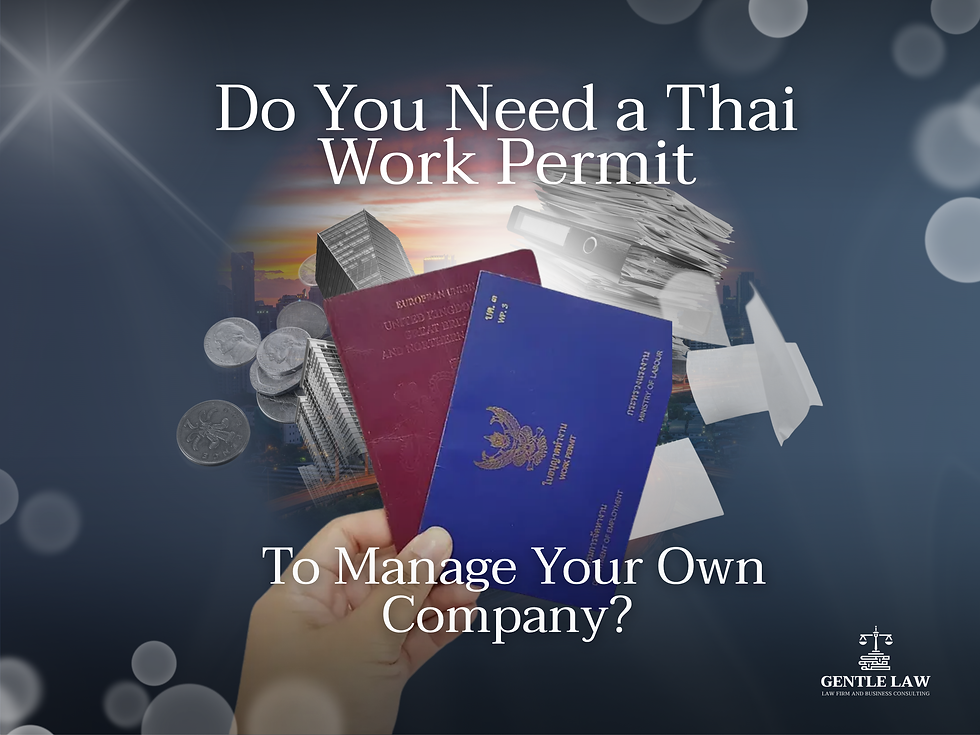Top 7 Legal Mistakes Foreign Entrepreneurs Make When Starting a Business in Thailand
- gentlelawlawfirm
- Jul 14, 2025
- 3 min read

Top 7 Legal Mistakes Foreign Entrepreneurs Make When Starting a Business in Thailand
Thailand presents a dynamic opportunity for international entrepreneurs — but it also has a complex legal landscape. At GENTLE LAW IBL, we’ve advised hundreds of foreign-owned companies across industries, and we've seen the same avoidable mistakes lead to costly setbacks.
This legal guide will walk you through the top 7 legal mistakes foreign entrepreneurs make when starting a business in Thailand, and how to legally and strategically avoid them — based on real laws and practical experience.
⚠️ Mistake #1: Using Thai Nominees to Circumvent Ownership Laws
Some foreign investors attempt to bypass the Foreign Business Act B.E. 2542 by using Thai “nominees” to hold majority shares (51%) on their behalf. This is not only illegal — it's a serious criminal offense.
Risks include:
Criminal charges under Sections 36–37 of the Foreign Business Act
Forced company dissolution
Blacklisting or deportation of the foreign director
✅ Solution: Use legally recognized methods such as:
BOI Promotion under the Investment Promotion Act B.E. 2520
Treaty of Amity (for U.S. citizens)
Genuine Thai shareholders with legally binding shareholder agreements
⚠️ Mistake #2: Choosing the Wrong Company Type
Many foreign entrepreneurs mistakenly register a structure that limits operations:
Representative Offices can’t generate revenue
Branch Offices require high capital and strict reporting
Thai Partnerships expose owners to personal liability
✅ Solution: The most suitable structure for most foreign SMEs is a Private Limited Company with an appropriate shareholding and paid-up capital structure. Legal guidance is critical to ensure compliance with the Civil and Commercial Code and the Foreign Business Act.
⚠️ Mistake #3: Underestimating Visa and Work Permit Requirements
Having a Thai company doesn’t automatically entitle foreign directors or staff to work legally.
Common errors:
Not meeting the 4 Thai employee : 1 foreigner ratio (standard under the Department of Employment rules)
Insufficient paid-up capital (typically THB 2 million per foreigner)
Applying for visa/work permit too late
Performing work beyond the permitted job scope
✅ Solution: Plan your Non-B visa and Work Permit strategy in parallel with company registration. Consider BOI structuring if hiring foreign talent is essential.
⚠️ Mistake #4: Using Copy-Paste Contracts or No Contracts
Using free online templates or having no contracts at all puts your business at legal risk — especially in Thai courts.
Real disputes we've resolved:
Thai co-owner selling assets without consent due to vague agreements
Staff leaking client data due to lack of confidentiality clauses
Investors backing out with no binding terms
✅ Solution: Draft contracts in accordance with Thai law, with clear dispute resolution clauses. Use dual-language formats (Thai and English) if needed.
⚠️ Mistake #5: Ignoring Thai Accounting and Tax Regulations
Foreign owners often delay or overlook:
Monthly filings for VAT, Withholding Tax (PND forms)
Annual audits required by the Revenue Department
Social security registration
Tax-deductible invoicing practices
✅ Solution: Engage a legal-accounting team from the start. Ensure monthly filings are submitted on time, with proper documentation under Thai Revenue Code.
⚠️ Mistake #6: Mixing Business and Personal Finances
Receiving company income into a personal Thai bank account may seem convenient, but it violates principles of good governance and triggers tax scrutiny.
✅ Solution: Open a corporate bank account under the company’s legal name. Keep all income and expense records transparent for auditing and tax filing.
⚠️ Mistake #7: Not Getting Professional Legal Advice Early
Too many foreign entrepreneurs rely on second-hand advice from forums, friends, or YouTube. This leads to misunderstandings and costly legal missteps.
✅ Solution: Consult with a law firm like GENTLE LAW IBL from day one. We specialize in guiding foreign-owned businesses with localized legal, visa, tax, and corporate strategy — all in one place.
📌 Summary Table: How to Avoid Foreign Entrepreneurs Business Thailand Legal Mistakes
Legal Area | Best Practice |
Ownership | Use BOI, Treaty of Amity, or real Thai shareholders |
Company Structure | Choose Private Limited Company |
Visas/Permits | Plan alongside incorporation |
Contracts | Draft under Thai law with dual language |
Tax & Accounting | File monthly, not just annually |
Banking | Use a corporate account only |
Legal Guidance | Hire local legal advisors early |
🤝 How GENTLE LAW IBL Supports You
Our legal team helps you:
Set up your company with the right legal structure
Draft enforceable contracts in Thai and English
Secure Non-B visas and Work Permits
Apply for BOI promotion with maximum flexibility
Stay compliant with Thai tax, accounting, and labor law
Receive ongoing legal advice as your business grows
We’re not just lawyers — we are your legal growth partner in Thailand.
📩 Ready to build your business in Thailand legally and confidently? Book a free consultation today at gentlelawibl.com



